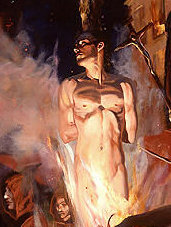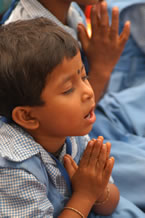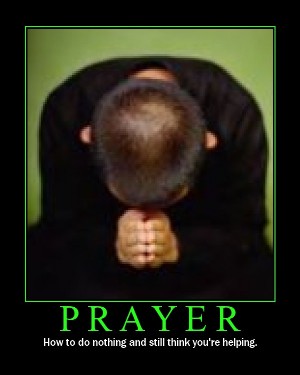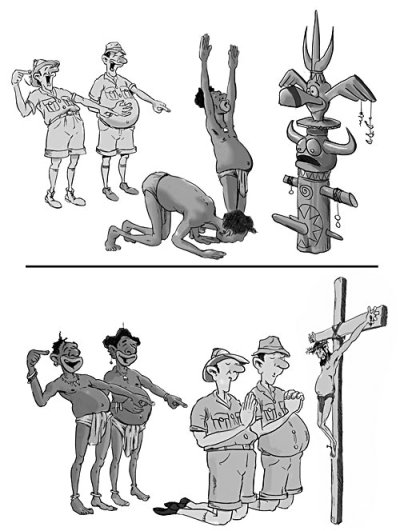Respect or Ridicule
Spinoza wrote in 1667: "...I have made a ceaseless effort not to ridicule, not to bewail, not to scorn human actions, but to understand them". Spinoza was a key figure in the development of the naturalistic view of the world, that rules out the supernatural, so his advice is to be taken seriously. You might be right...yet don't need to be rude.
 This courtesy has not been given to atheists by organized religions. When Catholicism was strong in Europe, those who dared to say such heresies as "the Earth revolves around the Sun", where burned or thrown in jail. Even today, in countries where organized religions are still strong, such as the United States or Iran, there are laws against atheism. In Texas, a Christian stronghold, a (rarely used) law says that people an official may be "excluded from holding office" if she/he does not "acknowledge the existence of a Supreme Being". In Iran, an Islamic Republic, irreligious people have technically no right to live.
This courtesy has not been given to atheists by organized religions. When Catholicism was strong in Europe, those who dared to say such heresies as "the Earth revolves around the Sun", where burned or thrown in jail. Even today, in countries where organized religions are still strong, such as the United States or Iran, there are laws against atheism. In Texas, a Christian stronghold, a (rarely used) law says that people an official may be "excluded from holding office" if she/he does not "acknowledge the existence of a Supreme Being". In Iran, an Islamic Republic, irreligious people have technically no right to live.
Christopher Hitchens says: "... religious belief is ineradicable as long as we remain this stupid, poorly evolved mammalian species ... our prefrontal lobes are too small. And our adrenaline glands are too big. And our thumb finger opposition isn't all what it might be. And we're afraid of the dark, and we're afraid to die and we belief in the truths of holy books that are so stupid and so fabricated that a child can – and all children do, as you can tell by their questions – actually see through them."

Religion comes from a time in which we knew even less about how the natural world works than what we know today. It is based on not questioning the authority, in suspending critical thinking, in not confronting doubts, in quietly accepting dogma. It is, in synthesis, a force from the past that drags mankind. But this is not the main reason why religious authorities do not deserve our respect.
Religious education is damaging for children. In Catholic or Protestant schools, children are given a ton of rules that are impossible to comply, and then they are told to feel guilty, dirty, by not being able to abide to those impossible rules. And how can they be taught sciences, biology, language, maths, history, if at the same time they are taught not to question religious dogma? Both things are incompatible.
 A child is underage for voting, is underage for drinking alcohol, is underage for registering in a political party, and is underage for deciding his/her religion, and is not given the opportunity to do so either. In an open society, as Daniel Dennet suggests, children should learn more about religion, not less. As part of their education, they should learn the creeds, customs, prohibitions and rituals of the major religions, the history of those religions and their geographic distribution. In this way, they would be able of taking a more informed decision about what to believe.
A child is underage for voting, is underage for drinking alcohol, is underage for registering in a political party, and is underage for deciding his/her religion, and is not given the opportunity to do so either. In an open society, as Daniel Dennet suggests, children should learn more about religion, not less. As part of their education, they should learn the creeds, customs, prohibitions and rituals of the major religions, the history of those religions and their geographic distribution. In this way, they would be able of taking a more informed decision about what to believe.
There are other ways in which organized religions do harm. For instance, there are patients that reject medical treatments on religious grounds, or that are convinced by pastors and other community leaders that only prayer can save them. A recent case is a typical example: "Their pastor had told them that praying and fasting are much better remedies against the AIDS virus than the hospital treatment. However, they didn’t work at all. After two months, the virus was still there and these people no longer believed the pastor.".

Catholicism collides frontally with medicine in countries of Africa or Latin America in which AIDS is killing scores of people. The use of condom lessens significantly the risk of acquiring AIDS, and experts in public health unanimously support policies that ease the access to condom. But the Catholic church asks Catholics not to use condoms: the sixth commandment has as a consequence that "every action which, whether in anticipation of the conjugal act, or in its accomplishment, or in the development of its natural consequences, proposes, whether as an end or as a means, to render procreation impossible, is intrinsically evil". Sex, for Catholic authorities, is only a mean to reproduction. There are over 33 million people with AIDS in the world, 2.1 million people died of AIDS in 2007, among them 330.000 children. And the Catholic church continues pointing their flock in the wrong direction.
When churches had power, we saw what they were capable of. Now that they still have some power, they still do harm. Organized religions have not earned the respect of the public. We can give it to them, but it is not because they have earned it; and we have the right to criticize religions, as well all of the other human creations.
Sources: Michael Shermer, particularly his article in SciAm in September 2007, Christopher Hitchens, Nathan Bond, Newsweek, De Staandard via DigitalJournal, US catholic bishops, Bandali.no.



